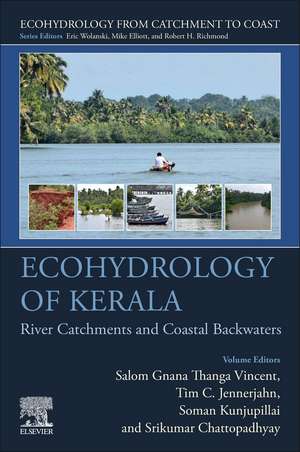Ecohydrology of Kerala: River Catchments and Coastal Backwaters: Ecohydrology from Catchment to Coast
Editat de Salom Gnana Thanga Vincent, Tim C. Jennerjahn, Soman Kunjupillai, Srikumar Chattopadhyayen Limba Engleză Paperback – 14 noi 2024
This book can be used as a tool in the holistic management of resources, and to devise proper mitigation measures. The content of the book is a model for other tropical regions and countries with rapidly developing economies and populations
- Presents spatial maps and easy to follow figures in each chapter, aiding in a foundational understanding of the topic
- Provides a fully comprehensive overview, including biogeochemistry, ecology, productivity, livelihood, socioeconomic aspects, and governance of the rivers
- Includes specific cases of ecohydrology in the river basin, especially from rivers and coastal lakes of Kerala
Preț: 619.79 lei
Preț vechi: 806.40 lei
-23% Nou
Puncte Express: 930
Preț estimativ în valută:
118.61€ • 123.38$ • 97.92£
118.61€ • 123.38$ • 97.92£
Carte tipărită la comandă
Livrare economică 08-22 aprilie
Preluare comenzi: 021 569.72.76
Specificații
ISBN-13: 9780323956062
ISBN-10: 0323956068
Pagini: 350
Dimensiuni: 216 x 276 mm
Greutate: 0.82 kg
Editura: ELSEVIER SCIENCE
Seria Ecohydrology from Catchment to Coast
ISBN-10: 0323956068
Pagini: 350
Dimensiuni: 216 x 276 mm
Greutate: 0.82 kg
Editura: ELSEVIER SCIENCE
Seria Ecohydrology from Catchment to Coast
Cuprins
- Ecohydrology of river catchments and coastal backwaters in Kerala, India: An introduction and synthesis
- Geomorphic setting and geologic features of Kerala and their link to eco-hydrology of the region
- Hydrological setting of Kerala
- On the drivers of summer monsoon rainfall over Kerala
- Riparian vegetation in Kerala’s river basins: Diversity, ecological functions and restoration prospects
- Forests and its biodiversity in the Western Ghats of Kerala
- Hydromorphic acid saline soils of Kerala: An ecohydrology based fertility assessment
- Current insights on biota from the submarine groundwater discharge(SGD) ecosystem
- Coastal sediment microbiome: Structural and functional diversity of bacteria and archaea in Vembanad Lake of Kerala
- What makes the coastal lakes a source of methane? Biogeographic pattern of community structure and functions of methanogenic archaea in Vembanad Lake, Kerala, India
- Land use/land cover change detection for climate-smart sustainable management in the selected river basins of Kerala, India
- Assessing submarine groundwater discharge and nutrient fluxes along the southwest coast of India
- Impact of natural control factors, land use and a large pilgrim centre on the biogeochemistry of suspended particulate organic matter in the Pamba River, Kerala, India
- Trophic status and fate of nutrients and organic matter in the Vembanad estuary related to land use in the Pamba river and other contributing rivers
- Identification of pollution potential zones of a coastal lake system using GIS techniques
- Integrated Coastal Zone Management practices and cumulative environmental impacts: The case of Vembanad Lake, a tropical estuary in India
- Collaborative evolutionary governance of estuaries in Kerala, India
- Challenges of water governance related to human-induced nutrient input in surface water bodies: Lessons learned from case studies in India, Indonesia and Germany




